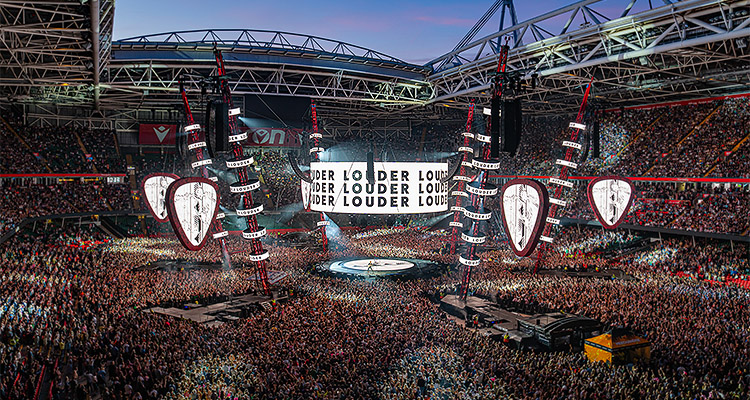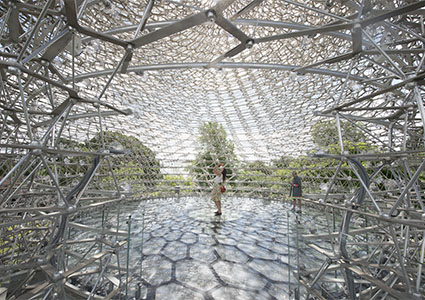
Unlock the magic behind live entertainment with Stage One
Founded in 1982, Stage One is the creative powerhouse behind some of the creative industry’s most iconic sets and stages. From Olympic ceremonies to sellout stadium tours, Stage One is a creative construction company renowned for designing, manufacturing and erecting structures for the creative industries, sitting at the intersection of design and technology.
As technological advancements continue to transform creative industries, Stage One is keen to remain at the forefront of innovation, using new solutions and mechanisms to construct never-before-seen productions. Manufacturing Today sat down with Tim Leigh, Managing Director at Stage One, to find out more about its project secrets and how the business is able to stay ahead in this competitive landscape. 
“Our first giant break was in 2004 when we worked on the Opening Ceremony for the Athens Olympics,” Tim reminisces. “We created a giant Cycladic head, which was winched out of a pit and then exploded across the stadium, and Björk was dancing on top of one of those pieces. For the business, that was a real make or break moment. It transformed us from really small projects onto the world’s stage. Since then, we’ve been involved in the majority of Olympic ceremonies.
“I joined the company in 2013 when there were approximately 80 people. We’re now at around 132 people working across all sorts of disciplines. We’ve got the regular support functions – finance, HR, commercial, and sales – but the majority of the people working for us have a manufacturing or engineering function, working as designers, CAD engineers, and mechanical and structural engineers, right through to those in the workshops.”
Equipped with a strong team possessing such a diverse skillset, Stage One’s capabilities cover a wide range of services and solutions. From design development and consultancy services to metal fabrication, carpentry, painting, and 3D printing, the company is able to offer the full package – whatever it takes to execute its clients’ visions and bring their ideas to life.
“We collaborate with some really interesting clients, from creative agencies and technology companies to designers, architects, artists, and producers,” Tim continues. “They’ll come up with the creative, and then it’s our job to take that idea, whether it’s a sketch on the back of an envelope or a fully dimensioned render, and turn it into physical form.”
Additionally, Stage One’s automation department is essential in constructing innovative experiences. Its CAD team, which takes on the design drawing, works alongside the operations team and project managers to ensure that all of a project’s moving parts are designed and delivered to perfection.
“Our automation creates software to control the movement of engineering hardware,” Tim explains. “For example, if you had a stage lift in an arena show, we write the software that will control the motors to lift that stage. It’s not just stages; it’s flying performers, revolves, hydraulic lifts – it’s all manner of technology that will be used to move and reveal performers or scenery on site.”
To stay ahead of the curve, Stage One is actively investing in new sophisticated, state-of-the-art technology and equipment as it looks to take on larger, more heavily engineered projects.
“We’ve invested in precision milling equipment for our engineering department and machine shop, and we’ve also started to productize our automation kit. We have a full range of servers, control software, consoles, and cables so that people can effectively select the correct stage automation kit from an inventory and configure their own solutions,” Tim describes. “We are much less artisan now than we are engineering focused. These projects are more difficult, but certainly more exciting.”
This constant innovation is just one of the ways in which Stage One centralizes ‘reactive development’, a mindset which differentiates the company from its competitors.
“We are faced with increasingly short timelines. You can’t tell people who bought tickets to an Ed Sheeran show that you’re going to be six weeks late. You’d never do another job again,” he details. “We have to be very adaptable and flexible, implementing solutions as we go along. It’s that kind of reactive development that sets us apart. We can move very quickly, and so we’re able to entirely out-compete the smaller organizations coming up behind us.”
 It was this competitive edge, combined with design and engineering excellence, that led to Stage One being the constructor of choice for Ed Sheeran’s Mathematics tour. It was a large-scale project requiring cutting-edge construction with a fast turnaround, designed to be used at multiple locations. Tim tells us more about what the project entailed.
It was this competitive edge, combined with design and engineering excellence, that led to Stage One being the constructor of choice for Ed Sheeran’s Mathematics tour. It was a large-scale project requiring cutting-edge construction with a fast turnaround, designed to be used at multiple locations. Tim tells us more about what the project entailed.
“Ed was very keen when playing large venues not to just stand at one end of the arena, because if you bought tickets and you’re seated at the other end of the pitch, you don’t feel particularly connected to the artist. He wanted to place himself front and center in the middle of the stadium,” he shares. “Building a stage itself in the middle of an arena isn’t too hard, but then you have to determine where you’re going to hang all the speakers, the speaker arrays, and the video screens, as well as the scenery and lighting to make it a real show that packs a punch. Most importantly, it all had to be erected within two and a half days.
“We had just over three months from order to his first show. We had to create a structure which could support 50 tons of audio and video equipment above the stage, so we created six 30-meter masts, which came out of the stage cantilevered on ballasted bases. We then strung a steel wire cable net – like a spider’s web – at the top of these masts. We could then use that as the structure to take the load of video, audio and lighting. It was a beautifully produced, highly engineered structure, configured to be erected and demounted in really short order. It was a great project.”
As 2024 draws to a close, Stage One’s future is bright, and the business has no intention of slowing down. Whilst continuing works on the Elvis Evolution project at Docklands, which is set to open to the public in spring 2025, the company is excited to take on more challenging engineering projects, particularly timber based projects that align with its sustainability goals.
“We’re really encouraged by the way in which immersive experiences are becoming a real thing. A few years ago, people were interested in buying things; now, we believe that people are interested in buying experiences, and that works well with what we offer,” Tim concludes.
Remaining reactive to market demands, Stage One is a business defined by ambition – one that will continue delighting audiences for years to come.